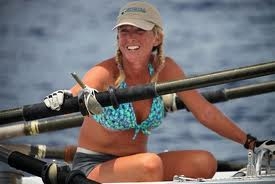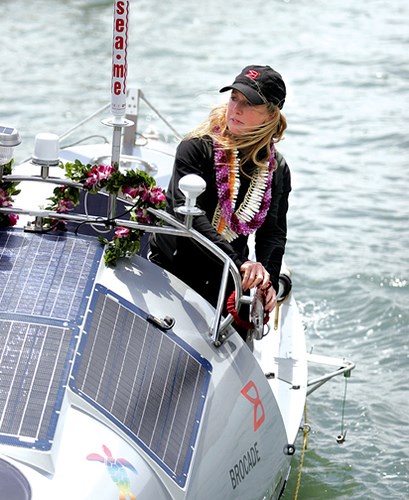 |
| Roz Savage (http://www.rozsavage.com/about/ ()) |
"Do not go where the path may lead, go instead
where there is no path and leave a trail" (Ralph Waldo Emerson). A hero is
someone who follows the road not taken to achieve success and adventure in order
to make an impact on the world. An example of a hero is Roz Savage, who created
her own path of adventure on a voyage alone, resulting in creating a
difference in the planet. In 2002, at the age of 32, Roz Savage had everything
a girl ever wanted, a huge house in London, a sturdy eleven year-old career as
a management consultant, a happy marriage and sports car. Although, behind all
the glitz and glory lay an unhappy woman with something missing in her life:
adventure. By 2003 she found herself in an unraveling marriage and trapped in a
corporate job rut. Behind the doors of an investment bank she yearned for a
life of adventure. She desired living a momentous life, full of achievements
and victories, one you would love to read about in the highlights of the latest
news reports, or hear about in a heroic story. Therefore, she engaged
herself in scripting two obituaries describing the achievements she could
acquire in the future. The first obituary portrayed the life she wanted to reach,
full of stunning successes and significant failures. The second obituary expressed
the life she was heading for if she carried on with her daily lifestyle.
Mesmerized by her first obituary based on her fictitious life, Roz Savage
looked at the artificial life as a motivational list, steering her on the
adventures she would reach as a proficient woman. In the process of following
the heroic path of adventure, Savage sacrificed her life and left everything
that represented her, including her house, her husband and her job. While on
this path, Savage entered a rowing race in which her determination and bravery stood
out. As she carried on with tremendous perseverance, Roz Savage gained the
title of four world records for ocean rowing, including the first woman to row
the "Big Three": the Atlantic, the Pacific and the Indian oceans. She proudly suffered 5 million strong
oarstrokes and rowed over 15,000 miles. As her first rowing journey along the
Atlantic came to an end, Savage discovered an insightful attachment to the
environment and its condition. People look at Roz Savage as our modern-day hero
due to her bravery in her hardships, sacrifice, determination, and motivation in
changing the status of our environment and keeping beauty alive.
After eleven years of Savage's life as a project
manager she decided she wasn't happy with how her lifestyle came to be; she longed
experiencing what it was like in the bustling world beyond the windows of her
usual routine. She wanted change, a change in her lifestyle and the way people
look at her. She realized how unhappy she was with her life and how it became
so mundane: "Who I was on the inside didn't match the besuited management
consultant I had, almost inadvertently, become on the outside. Desperate to
figure out what I should do, I sat down one day and wrote two versions of my
obituary". She wrote one dedicated to the daring life she wanted, after
rowing the Atlantic Ocean race, and another which illustrated the life she
would have if she carried on as she was. Ideas were whirling in her head as she
considered both successes: "I thought of the obituaries that I enjoyed
reading, the people that I admired. They were the adventurers and risk-takers,
the people who seemed to have lived many lifetimes in one, the people who had
tried lots of things, some of them triumphs, some of them spectacular failures,
but at least they'd had the guts to try. They didn't give a damn what anybody
thought of them; their own opinion of themselves was all that mattered...These
people really knew how to live." Savage discusses the life she would love
to have, one where nothing anyone stated mattered. She compares a fantastic
life with one to live up to, an existence where others would recognize one as a
legend because of their significance and the impact they made on their life.
Savage thinks that people should live life with motivation in accomplishing
something huge, to take a huge risk by doing the unexpected and to live up to
their full potential. The other obituary expressed the achievements she would
attain as a normal person; if she stayed the way she was and never made her own
path of exploration. "The
second version was the obituary that I was heading for--the type you wouldn't
want to read in the paper". Here, she was broad, describing the life she
currently had, a normal lifestyle with its occasional moments of excitement,
but never extending beyond the boundaries of complete liberation. Seeing an
immense gap between the two lists of opportunities she decided to do something
about her normal routine and chose to change it into a life based on her first
obituary. Savage is a self-starter
who decided to begin an audacious journey on her own. Before she took off to
row the Atlantic, people shared with her stories of defeat: "They said I
was crazy. They said I wasn't big enough, not tall enough, not strong
enough." But with much determination she acted like the legendary heroes
she wanted to connect to; the risk takers, the people who didn't care what
anyone thought of them as long as they lived a momentous life. Ignoring the
negative thoughts, Savage dedicated her time to preparing for the big day, the
race, and didn't waste a second. In this allotment she trained every
day, prepared meals, and invested her life's savings in an ocean rowboat. Roz
Savage is a self-starter who carefully planned her future by creating goals to
achieve success along her adventurous path.
 |
| Roz Savage on the ocean (http://www.treehugger.com (http://www.flickr.com)) |
Savage thought about her routine and lifestyle and tried
to determine what to associate with the life she wanted to face in the future. Savage
thought about the lifestyle she wanted to team up with: "She realized that
if she carried on as she was, she wasn't going to end up with the life she
wanted. So she turned her back on an eleven-year career as a management consultant
to reinvent herself as a woman of adventure." In spite of reaching her dreams of achieving success, Savage
took the pain of leaving her husband, job, home, possessions and beautiful life
and followed the path leading to her dreams that held the ache from the
agonizing pain, which tuned into a dreadful, yet pleasing paradise. In 2005,
Savage found herself stuck on a 23-foot rowboat with nothing but a water-maker,
dried food, a laptop and a satellite phone, and alone in the Atlantic race. "I found myself, at 38, divorced,
no kids, no home, and alone in a tiny rowing boat in the middle of the Atlantic
Ocean. I hadn't eaten a hot meal in two months. I'd had no human contact for
weeks because my satellite phone had stopped working. All four of my oars were
broken, patched up with duct tape and splints. I had tendinitis in my shoulders
and saltwater sores on my backside. I couldn't have been happier." She
demonstrates sacrifice through her actions of leaving everything behind, in
spite of making her more contented, even if she had to conquer dangerous
obstructions along the way down. Roz took the initiative of leaving the things that defined her life and security, which provided her with the
trait of courage. Even though, when one looks at her life from before, it
seemed flawless, it described the dream life, and others wondered 'Why would
somebody who seemed to have everything, just throw it all away? "But did
I really have it all? I would sit on the commuter train on my way to the
office, wondering if this was what life was all about. I wasn't happy. I wasn't
fulfilled. I wasn't being true to my values" (Source 5). No one should
have to live a dreadful life full of unused, dreadful moments if they can
change the way of life for themselves. Savage is an example of someone who
took the initiative to be at peace with herself, to escape her unhappy state
and to join in on the life worth living. Her finish in the race granted her the
power and ecstasy of a life filled with accomplishments and a life which she would
enjoy forever. She has overcome challenges in her life but each one evolved
into an experience she was proud of accomplishing because it made her who she
is today, and changed her for the better.
 |
| Savage turning on her adventure (http://5gyres.org ()) |
Roz
Savage experienced thoughts of defeat and failure, but through much dedication
and determination to her passion of rowing, she found the courage to carry on
with her protracted journey. Savage inspired herself with her own motivational
thoughts and words as she wiped the tears from her face: "Would you like
to give up," she (her mother) asked. I thought about it for a moment. I wanted
nothing more than to be off this tiny, tippy boat. But, I knew that if I quit I
would never forgive myself. "No, Mum," I said. "I'll stick with
it".
She agonized through
every breathtaking obstacle when her ores broke, gloves tore, and blisters
rose, all while she experienced tendinitis in her shoulders. Although, Roz
didn't let these destructive thoughts get to her, she still struggled to
ignore the negativity that attempted to weigh her down, but inspired herself to
carry on the voyage with a strong mind at hand. People don't call the 3,000
mile trail around the Atlantic Ocean a "challenge of a lifetime" for
nothing: "Of the twenty-six crews that set out from La Gomera, six
capsized or sank and didn't make it to the finish line in Antigua. There were
times when she thought she had hit her absolute limit, but alone in the middle
of the ocean there was no choice but to find the strength to carry on" (Source
5). Roz Savage had knowledge of the missing ones who either died or were
capsized and had the option to opt out of the race. But, her devotion and
fortitude seized her from thinking about those downbeat thoughts. Savage knew
that it could have been her caught in a hindrance like her prior opponents, and
she realized she was in an even more complex situation; she was an
unaccompanied rower. Instead of thinking about the negativity, she ignored the
thoughts as they advanced towards her, building more strength to carry on. During
her extensive journey, Savage experienced a livelihood of pure beauty. She
observed the waking sunrises, breathtaking sunsets, and came across wonderful marine animals such as turtles, fish, sharks, dolphins and whales.
This adaption to the ocean life changed her perspective on the environment and reminded her of the environmental challenges that were facing
wildlife as well as our society today. As a consequence, Savage grew to become
an environmental campaigner and keynote speaker. Upon finishing her heroic
adventure across the Atlantic, as well as the "Big Three", Savage spreads her
story and inspires others to take part in the environment and act on the
changes that are tearing our world apart. "An
accomplished and inspiring keynote speaker with a charismatic stage presence,
Roz has spoken to tens of thousands of people across six continents. Past
engagements include the Royal Geographical Society in the UK, the National
Geographic Society in the US, the TED Conference and the Vail Symposium, as
well as numerous corporate speaking engagements. Roz Savage is a a United
Nations Climate Hero. In 2010
she was named Adventurer of the Yearly National Geographic" (Source 4). Roz Savage is a
determined individual who is recognized for her dedication to row across the
world, gaining success as a solo rower, as well as being an inspirational
speaker who speaks on behalf of her adventure, inspiring others today.
Others admire Roz Savage and look to her as our hero due to her bravery in overcoming her intriguing obstacles, sacrifice, determination towards achieving her goals, and motivation for changing the world. Her steadfastness, determination, bravery and overall enthusiasm finally was worth the drive she sacrificed along the 103 day Atlantic voyage. She worked as a strong and brave warrior through the broken oars, the torture of her blisters, tendinitis, torn gloves, high tides, and tears; which all made her stronger. Savage is someone who exemplified leadership in choosing not to follow others in their tracks, and instead made her own footsteps where others could follow. "Do not go where the path may lead, go instead where there is no path and leave a trail" (Ralph Waldo Emerson). Roz Savage inspires me because of her drive to gain a joyful and momentous life full of achievements, failures and victories that make her proud to live through, and to not survive like the ordinary population who goes along with the crowd. She demonstrates that life is worth living if you have fun, make your mark and have others identify you as an outsider from the same old crowd. She not only enlightens others to discover their role in the world, but also educates and warns her community and society of the dangers our planet has to face. She inspires others to help keep the beauty of the wildlife alive by taking action and being a leader in the environmental changes facing our home.
Appleyard, Diana. "Rowing Solo." Dailymail.co.uk.
Mail Online,
15 Jan. 2010. Web. 22 Mar. 2012.
Kirkus Reviews. "Rowing The
Atlantic." Literary Reference Center. Kirkus Media, LLC 1 Aug.
2009. Web. 22 Mar. 2012.
My Transoceanic
Midlife Crisis By: Savage, Roz, Newsweek, 00289604, 3/28/2011, Vol. 157, Issue 13/14
"Roz Savage, Ocean Rower." Biography
-. Arktisma. Web. 22 Mar. 2012.
"Roz
Savage, Ocean Rower." Rozsavage.com/contents. Arktisma. Web. 22
Mar. 2012.
Page created on 4/23/2012 12:00:00 AM
Last edited 4/23/2012 12:00:00 AM
